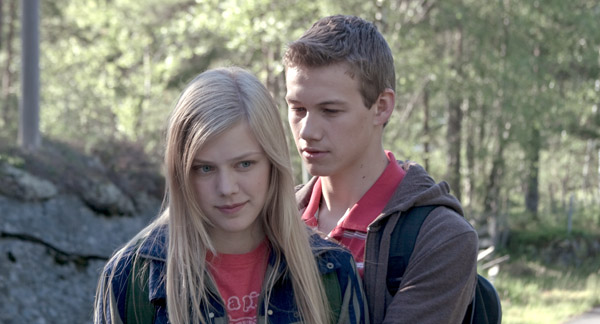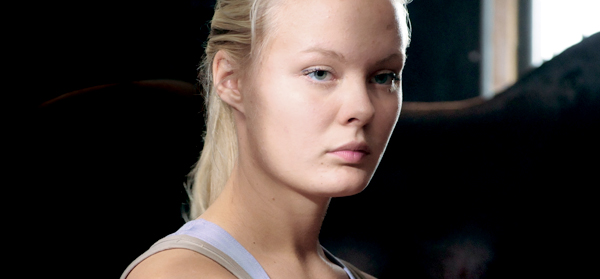|

Reviews of Recent Independent, Foreign, & Documentary Films
in Theaters and DVD/Home Video

TRIBECA FILM FESTIVAL, PART 3
April 20 ñ
May 1, 2011
The foreign contenders in this yearís Tribeca Film Festival mostly
outshine the homegrown flicks in this round-up. Though only one of the
foreign features is truly remarkable (NEDS), two documentaries (Jiro
Dreams of Sushi and Cinema Komunisto) are particularly
interesting, insightful, and entertaining. Of the two films in the
world narrative competitionóboth sexy and Scandinavianóthe sober Swedish
film She Monkeys is no match for Turn me on, Goddamitóa
raunchy Norwegian tale of teenage daydreams. However, some of the highly
anticipated filmsóLast Night with Keira Knightly and CÈdric
Klapischís My Piece of the Pieóare the greatest disappointments
of the lineup. The films below are in order from the very best (NEDS)
to pretty darn good (from Jiro to Klitschko) to sheer
celluloid embarrassment (Janie Jones).
NEDS
Even
with Kubrickís Clockwork Orange and Shane Meadowís
This is England as primers for violent British cinema, Peter
Mullanís
savage film about knife-wielding teenage thugs roving through 1970s
Glasgow will still shake you to the core. Shy and clever young John
McGill is beaming with promise when he is befriended by not-so-sweet-and-tender hooligans. His conversion into a self-destructive
monster happens faster than the film can comment on, and we can only
assume that heóa product of a violent homeóhas always teemed with unseen
rage. Unlike This is England, NEDS allows the difficult
subject to devastate us more immediately by not indulging in the
projected glamour of these Doc Martin-wearing punks. But the
indecipherable Scottish ramble (accompanied by subtitles) and Johnís
cheeky teachers amuse us just enough to stave off complete despair.
Available on
On Demand through June 23.
Jiro Dreams of Sushi
A
documentary about a $300-a-head Michelin three-starred restaurant
shouldnít be able to capture the soul of a country as well as Jiro
seems to do. The filmís namesake is an 85-year-old sushi chef who
has been tirelessly preparing the worldís most consistently flawless
sushi for the most of his life. His sons, one of whom flew the nest to
run his own restaurant, are Jiroís humble disciples, cherishing their
fatherís incomparable ability to select, handle, and prepare the perfect
piece of fish and all its mouth watering accoutrement. The family
dynamic and Jiroís stories of his samurai work ethic elegantly shift the
filmís perspective from food to Japanese tradition almost without ever
taking the camera out of the kitchen. And with food scenes rivaling the
sensual mastery of I Am Love, this film will be especially
devastating if not followed by reservations at the best and nearest
sushi restaurant.
Cinema Komunisto
In addition to being the authoritarian marshal of the formal Yugoslavia, Josip Broz Tito was also, apparently, something of a film buff. A
gargantuan film industry boomed in the county during his reign, and Tito
couldnít be happier to support it, sending soldiers to serve their
entire tour of duty as extras or allowing the blowing up of functioning bridges for a
scene. Cinema Komunisto is the swinging tale of the hotshots
(actors, directors, producers) responsible for the hundreds of
commie-friendly, mostly military-focused films that Yugoslavia churned
out until it was torn apart by war in 1991. Aside from their scale and
frequency, the movies donít seem particularly noteworthy, but this
communist strongholdís close ties with Hollywood (Richard Burton played
Tito in one production) is certainly a tale worth telling.

|
Turn me on, Goddammit
The landscape of teenage daydreams (the
raunchy kind) are captured with titillating precision in this stylish
comedy about one girlís explosive sexual awakening. Stuck in a tiny
Norwegian town, Alma spends her afternoons calling a friendly phone sex
operator and fantasizing about a dreamy classmate. When sheís shunned by
her school (and even the neighborhood toddlers) for telling an
uncorroborated story about said crushís unusual pass at her, her social
isolation winds her sexuality into even more of a frenzy. Frequent
musical interludes over images of angelic blondes in gleaming IKEA-laden
apartments seem like commercials for organic cotton, but they are cut
off as harshly as an interrupted reverie.
Klitschko
The Ukrainian brothers and boxing
superstars Vitali and Wladimir Klitschko are the subject of this
engaging documentary about two professional athletes who have each
reached the pinnacle of their sport, earned doctorate degrees (in sports
science), and made good on an oath never to face each other in the ring.
Sebastian Dehnhardtís film also delves into other issues that weigh on
the post-Soviet soul of many Ukrainians: among them, the bitter legacy
of Chernobyl and a blend of suspicion and intrigue about the West. As a documentarian, Denhardt
realizes heís in the presence of a great subject, and he doesnít allow
flashy filmmaking to get in the way of a story that touches upon so many
subjects but, ultimately, centers on how two men, as brothers more than
boxers, endure.
Treatment
This fresh and zeitgeisty satire about one screenwriterís desperate
gambit for his big break pokes fun at the absurd perseverance it takes
to make it in showbiz. Struggling writer Leonard (Joshua Leonard) has the script but not
the leading man, so he checks himself into a $10,000/week rehab clinic
to befriend and recruit mega-star Gregg D. Deadpan one-liners with just
the hint of snark are reminiscent of HBOís Bored to Death, and
just like in that treasure of a show, John Hodgeman makes an
irresistible appearance. But the urgent reality-TV quality of the camera
work and the small-screen acting overstays its welcome when the film
takes a buzz-killing turn for the serious.
She Monkeys
In a sleepy Swedish town where sturdy,
blond women seem to grow on the vine, an unusual friendship develops
between 15-year-old Emma and Cassandra, her sultry, slightly older
teammate on the equestrian acrobatics team. The relationship grows from
mistrust to curiosity to sexually charged obsession with hardly a word
exchanged. The girls communicate through long, piercing glances, and
Emma expresses her loyalty by agreeing to play Cassandraís increasingly
dangerous games, testing social and physical limits as a pledge of each
otherís devotion. The quiet landscape shots are intended as haunting
naturalism, but they are momentarily captivating at most. Otherwise this
simple film leaves little to digest.
Last Night
Whatís worse, to cheat for sex or yearn to cheat for love, without ever
acting on it? A successful and beautiful young couple perched in a sleek
Manhattan loft poses this question when they are tempted by potential
lovers in the course of a night spent apart. Keira Knightley plays
opposite stoic Sam Worthington, whose minimal dialogue could probably
have been performed by a well-coiffed brick. Luckily, Keira talks enough
for the both of them, lending the film a theatrical feel reminiscent of
Closer. But unlike that film, which explores a similar theme with
far more sweep and nuance, Last Night is a rigid, albeit
stylishly-produced, scenario good for prompting a philosophical
conversation about cheating, but little else.
Available
On Demand.
My Piece of the Pie
Known for his energetic ensemble gems (L'Auberge
Espagnole,
Paris),
CÈdric Klapisch narrows his scope (and dulls his good sense for
narrative) with My Piece of the Pie, a confusing mishmash of
comedy and muckraking about the iniquity of global economics. A
mother of three (Karin Viard), who finds herself unemployed after her
factory job goes bust, takes a position in Paris as a cleaning lady to a
morally bankrupt multi-millionaire commodities broker (Gilles Lellouche).
After his son is dropped of at this doorstep, sheís bumped up from maid
to nanny, and begins weaseling her way into her bossís life with her
no-nonsense Fran Drescher advice from the other side of the social
divide. The film moves from one contrived plot point to another with
relative dignity for such a hackneyed set-up, but it falls flat on its face
by ending not with romantic catharsis but a pointless battle of
haves vs. have-nots.
Stuck Between Stations
Before Sunrise
set the standard for talk-heavy narratives confined within a day, and so
many hopeful imitators have consistently fallen short. A pretty, young
grad student (in the midst of a personal crisis) spends the night
flitting around Minneapolis with an old high school classmate on leave
from the army for his fatherís funeral. The characters donít seem bound
to any specific social groupólike the hipster youth of mumblecoreógiving
the film a generic, though realistic, energy. But the conversation, which
attempts to balance interesting taking points with lame but believable
chatter, could have used a little less authenticity and a bit more
pizzazz.
Janie Jones
A jaded, womanizing rock star saddled
with a 13-year-old daughter while on tour has the same irresistible
appeal as watching a mobster mope in therapy and should, at the very
least, make for a diverting film. Unfortunately, Janie Jones
takes the contrived but promising set-up and sinks it with one too many
clichÈd, eye-rolling scenarios. After being pawned off on her
rocker-daddy (Alessandro Nivola), Janie (Abigail Breslin) blossoms from
abandoned child to some Alanis Morissette-cum-MacGyver wunderkind,
warming papaís heart with her precocious tunes and knack for bailing him
of prison. Itís an uninspired, if occasionally entertaining, comedy
redeemed only by Nivolaís solid (and studly) leading role.
Maria My Love
This
unadorned profile of a young girl struggling with her motherís recent
death and her fatherís betrayal is as sincere and simple as it is
lifeless. Ana (Judy Marte) falls into a new relationship with a sweet,
young grocer, who pushes her to confide in him about her troubles. Not
able to verbalize her grief and confusion to him, she funnels her
emotions into an odd friendship with an aging recluse (Karen Black) whom
sheís determined to help. Though Blackís fiery performance adds some
professionalism to this under-ripe project, itís sorely in need of an
original spin.
Yana Litovsky
Tribeca Film Festival, Part 1,
Tribeca Film Festival, Part 2
April 23, 2011
Home
About
Film-Forward.com Archive of Previous
Reviews
Contact
us
|




